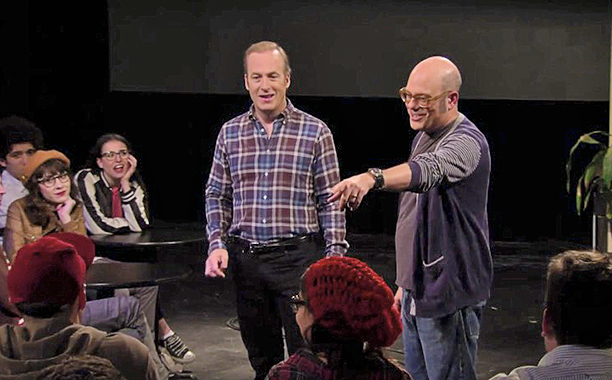HBO aired the final episode of Mr. Show with Bob and David in December 1998, by which time, as the DVD boxes pointedly state, the network was regularly bumping it from the schedule in favor of Real Sex. Seventeen years later, David Cross and Bob Odenkirk are two of the most respected and influential people in comedy and Mr. Show survived early cancellation and a disastrous film version to become a beloved cult classic. Now the duo are on Netflix for the reunion sketch comedy series W/ Bob and David. At four episodes it is an easy binge-watch, but if it is a necessary binge-watch is a matter for debate.
What Mr. Show Was
Cross and Odenkirk had the same gifts for jokes, wordplay, ribald satire, and comic timing as Monty Python at their best, but they added extra layers of ridiculousness. Sometimes they concocted bizarre ideas (Van Hammersley, who teaches every subject under the sun using his mediocre pool skills) but more often they would take already hilarious premises and stretch them in unexpected directions. The amount of unfailingly funny mileage Cross and Odenkirk could wring from two ad executives pitching a family-friendly “spokesthing” to a conglomerate or a History Channel documentary on the truth about monster parties in novelty songs and the sheer variety of that humor, is unparalleled.
Mr. Show came to me at the right time: I found the DVDs at the tail end of my high school years at the same time my overall worldview began to focus on the absurdities of existence. Bob and David were on my wavelength and they were working for posterity: the combination of anger, geniality, and inspired zaniness packed more of a punch than anything SNL or similar shows were doing, and spoke to my generation the way Monty Python spoke to my parents’ generation. To this day I can watch Mr. Show and except for the fashions, the program never feels dated and the jokes never fail to land.
One of the virtues of W/ Bob and David is that there is a similar timelessness on hand. The only sketch that feels specific to 2015 is a very clever one in which David hosts a public access show dedicated to showing people how to exercise their civil rights—by trying and continually failing to provoke a police officer. However, other parts of the show work far less well.
The Effects of Time
 W/ Bob and David reunites Cross and Odenkirk with all of the major players from Mr. Show: Tom Kenny, Jill Talley, Paul F. Tompkins, Brian Posehn, Scott Aukerman, and many more recognizable faces. Time has increased their stature and changed their appearance to a degree—the silver mane and somewhat thinner body on John Ennis is a shock—but it has not decreased their enthusiasm and energy. Bob and David lead the charge through their sketches with untethered joy. The nearly two-decade gap works against the show in another way. Audiences have seen the duo and their partners excel and expand in so many different mediums and vehicles, from Arrested Development to Better Call Saul. Except for one beautifully self-aware moment, W/ Bob and David is a show that acts like the fifth season of Mr. Show, as if they began writing sketches the day after season four wrapped. Bob and David’s personal developments and the success of their one-time supporting cast are ignored so everyone else can play second fiddle to the leads, whose personae are the same as they were in the mid-90s. Recreating the vibe is not necessarily a bad thing, but Cross, Odenkirk, and their writers also are clearly aware that this might be the final chance they will have to work together in this format, and this produces a detrimental side effect.
W/ Bob and David reunites Cross and Odenkirk with all of the major players from Mr. Show: Tom Kenny, Jill Talley, Paul F. Tompkins, Brian Posehn, Scott Aukerman, and many more recognizable faces. Time has increased their stature and changed their appearance to a degree—the silver mane and somewhat thinner body on John Ennis is a shock—but it has not decreased their enthusiasm and energy. Bob and David lead the charge through their sketches with untethered joy. The nearly two-decade gap works against the show in another way. Audiences have seen the duo and their partners excel and expand in so many different mediums and vehicles, from Arrested Development to Better Call Saul. Except for one beautifully self-aware moment, W/ Bob and David is a show that acts like the fifth season of Mr. Show, as if they began writing sketches the day after season four wrapped. Bob and David’s personal developments and the success of their one-time supporting cast are ignored so everyone else can play second fiddle to the leads, whose personae are the same as they were in the mid-90s. Recreating the vibe is not necessarily a bad thing, but Cross, Odenkirk, and their writers also are clearly aware that this might be the final chance they will have to work together in this format, and this produces a detrimental side effect.
Every sketch in W/ Bob and David feels as if it was written, rewritten, and re-rewritten to death by people who knew this was going to be a short season with a bigger audience than ever and, more importantly, a chance to cement the legacy of Bob and David’s sketch comedy. They try to cram as many jokes as possible into every bit, and the idea that there was a writer’s room where everyone’s ideas would be accepted—the same problem I wrote about two days ago in my SPECTRE review—expresses itself in sketches that don’t feel the same. On Mr. Show the sketches were masterfully timed in terms of overall length: ideas that needed expansion could go on for seven minutes or so while quick jokes were wrapped in under two minutes. Here, every sketch seems to last forever even if it’s not particularly funny, the most egregious offender being the climax of the second episode when they attempt to write a Broadway musical about the rooms in a house to satisfy a dry-cleaning company’s refund policy. (It…kind of makes sense?) The sketch drags in every minute and never produces a laugh.
Worse, the construction of the sketches, one of the golden parts of Mr. Show, is thrown off. For example, episode one includes a sketch about New Year’s Resolutions that provides a running throughline (a tactic they revived which I really like) and there is an obvious punchline delivered by Tomkins. The punchline is delivered in the middle of the sketch, and the rest of it rambles on to the point where it’s unfunny. Finally, not only are the sketches long, but they feel the need to introduce them with titles such as “Interrogation Sketch” as if they were museum pieces. It’s depressing to see the vitality sapped.
Why You Should Watch W/ Bob and David
Despite all of this, I would recommend devoting the two hours to binge-watching W/ Bob and David for two reasons. First, Bob Odenkirk and David Cross are comic geniuses. There were going to be some golden moments in this series and the best of them deliver: a sketch about digital tech gurus that brings out David’s most mocking side, Bob as a desperate-for-sympathy contestant on a very unusual cooking show (who also plays in a UFO tribute band), and the depiction of a Jewish pope ready to endorse the most kosher food on the planet to name three.
Second, I can’t think of a soul who lacks for Netflix, and if you have never experienced the stylings of this company, W/ Bob and David is an easily accessible introduction. People can decide if they like it…and if they do, they’ll find Mr. Show will have them rolling on the floor knocking over furniture.
Photographs from Laughing Squid, Entertainment Weekly, and Twitter.






